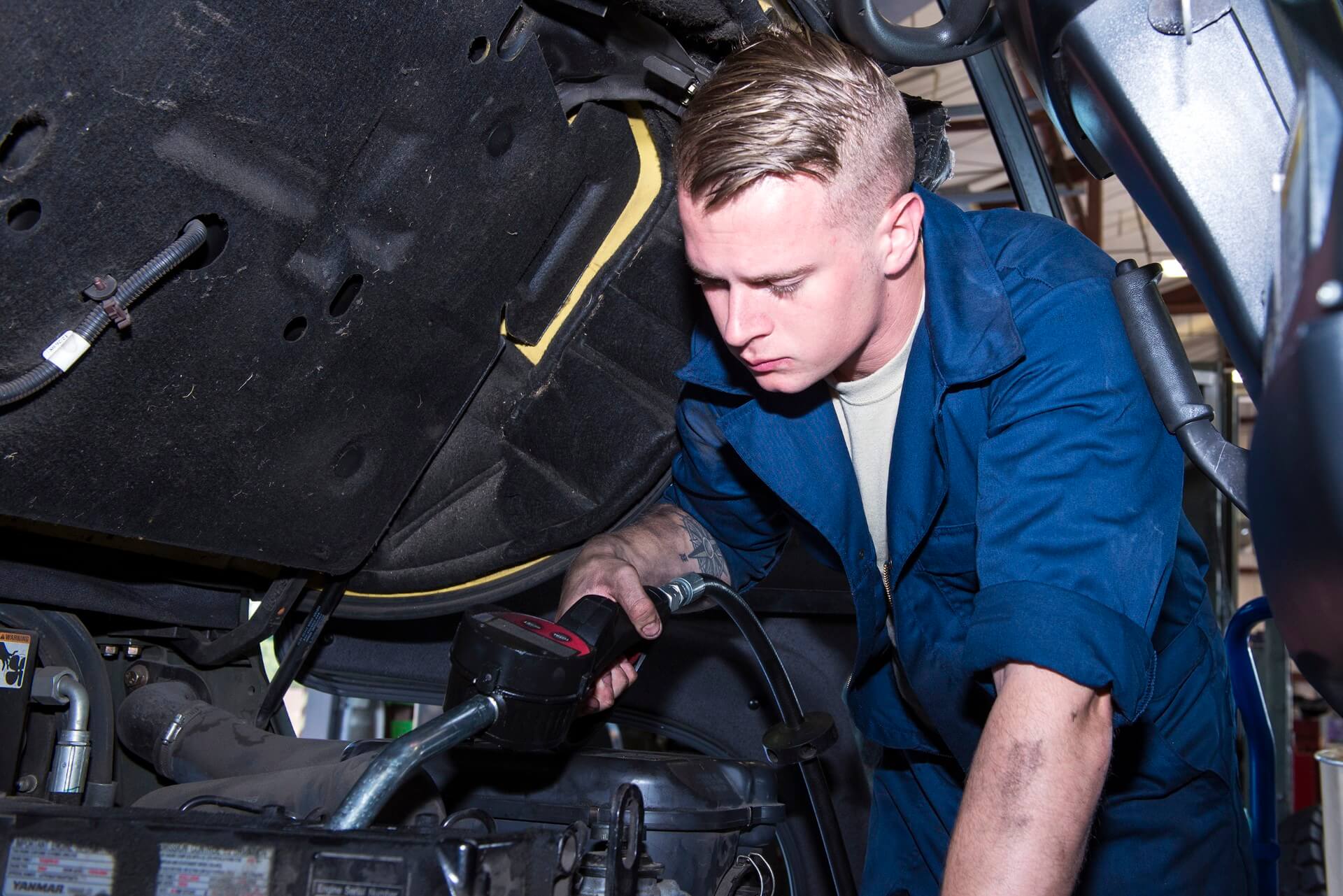Forklift servicing is essential for the safety of your workforce, the effectiveness of your forklift fleet and in ensuring you are in line with health and safety regulations.
Whether you are a business owner with a large fleet of forklifts, or an operator looking for more information on what you should be doing each day, this article should provide some insight into what you need to be aware of when it comes to forklift servicing, maintenance and daily checks.
Under the law, you must service your forklifts regularly and make necessary repairs. In recent years, there have been several high-profile forklift accidents, putting forklift servicing and maintenance in the spotlight. Good maintenance is essential in avoiding accidents, not only regular servicing but daily and weekly checks of safety features too.
In this article, we look at the legal requirements for servicing your forklift, and provide practical advice for ensuring your fleet is not only compliant but running at optimal performance. We also look at some of the things you should do either every day, or before you operate a forklift at any time.
What are the regulations around forklifts – what must be done?
There are UK-wide rules and regulations concerning the service and maintenance of lifting equipment, including forklifts. The ‘Thorough Examination’, as it is referred to in the relevant regulations, is regulated by Regulation 9 of the Lifting Operations and Lifting Equipment Regulations (LOLER) 1998. There are several regulations relating to forklift servicing, as we will discuss, as well as a non-legal framework for optimum forklift safety and maintenance.
The LOLER certification covers all parts of the mast, hydraulics and other lifting components. However, some parts of your forklifts will need additional accreditation under the Provision and Use of Work Equipment Regulations 1998 (PUWER). PUWER pertains to areas related to the functionality of non-lifting components. This includes things such as pallets, conveyor belts, and other load-bearing elements. Under PUWER, any parts at risk of deterioration over time must be inspected regularly. Compliance with LOLER is essential under the law, but should be regarded as the minimum requirement for forklift safety.
However, some checks do not adequately inspect every element of the forklift’s operation. As a result, the Consolidated Fork Truck Services (CFTS) created an in-depth and detailed standard in 2004 for carrying out Thorough Examinations. The CFTS tests cover every part of a forklift’s operation. The tests include chassis, steering components, tyres, brakes and more. This ensures optimum operation and performance for your forklift fleet. The CFTS test has been approved by the Health and Safety Executive (HSE), the regulatory body for health and safety in the UK. Such an inspection should take around an hour.
However, the Thorough Examination which should be carried out regularly is not the same as general maintenance of your forklift fleet, and there are many other things you must do daily, weekly or at regular intervals to ensure your forklift fleet is in safe working order.
What are Daily Checks?
Before using a forklift each day, operators should conduct ‘daily checks’. This is a necessary but straightforward daily maintenance check to ensure there are no apparent issues with the forklift. There are a number of components to daily checks, we have set out some of the key points below.
Liquid Levels
Operators should check the engine oil to ensure it is at a suitable level. Carrying out this check maximises fuel economy, and in the long-term will protect the engine block from wear and tear damage. The fuel level of the forklift should be checked too. Ensuring the forklift fuel level is sufficient can safeguard the catalytic converter and prevent the forklift from stalling. Operators and managers should be aware of creating a culture of checking fluid levels.Ensuring adequate fluid levels on a daily basis is economical, eco-friendly and can greatly enhance the safety and performance of your fleet.
Tyres
Before starting to use the forklift, operators should also check each tyre. They should ensure they are fully pumped up, and that the tread is still in good condition. Flat tyres and tyre blowouts can be costly, resulting in slower operations and forklift downtime. A daily visible inspection of tyres is enough, but you may wish to carry out a more in depth tyre check on a weekly basis.
Safety Features
It is important to check the safety features of the forklift. Afterall, what is the point in having safety features if they are not functioning properly? Be sure to check all alarms, lights and sensors, as well as the breaks and indicators. Checking safety features on a daily basis can greatly reduce the risk of a workplace accident. Common accidents that result from failure to check safety features include collisions, collateral damage or pedestrians becoming stuck or injured.
Daily Checks checklist
Operators should visually check :
– For leaks
– For any obvious damage
– The condition of the tyres, wheels and nuts
– Whether all of the safety lights are operating effectively
– The parking brakes
– Service
– The horn
– The steering
– The forks
– The chains
– The mast operation
– The anchor points
Operators should also check the fuel levels, radiator water/coolant levels and the hydraulic fluid levels.
Weekly Forklift Checks
In addition to daily checks and servicing, you may wish to carry our weekly forklift checks. Weekly checks are more in-depth than the daily visual inspection but are essential to the optimum running of your forklift fleet.
During a weekly check, operators should check and adjust the transmission and hydraulic oil levels. As described above, checking and adjusting fluid levels is essential in protecting the vehicle from transmission failure. Transmission failure can be very expensive to fix, and may even result in the need to replace the forklift entirely. When checking hydraulics, operators should ensure to be aware of oil lines and whether they have leaks that need to be repaired. You should also check the fluid levels of the power steering, the battery terminal and lift chain adjustment. This would make a reasonably thorough weekly assessment.
Steering Checks
Checking the steering of your forklift is important, and these should be checked each day by taking the forklift for a short drive in a reasonably clear area. How easy the forklift is to maneuver depends greatly on the responsiveness of the steering, and failure to check this can result in accidents causing injury to your team members or damage to your property. When checking the steering, attempt to perform a few simple maneuvers. You should pay attention to how the steering responds to your movements. Where the steering requires more force than is usual, you may have an issue with the steering system. Steering performance issues include: bad wheel alignment, low tyre pressure or friction in the gearbox.
How often does your forklift need to be serviced?
There are a number of factors which determine how often you should service your forklift. We have set out each of the things you should take into account below.
Manufacturers recommendations
Just like your car or van, your forklift needs to be serviced in line with the manufacturer’s guidelines. This will ensure that your specific type of forklift is kept in proper working order, and that essential elements such as lubricating oil are changed or topped up frequently enough.
The number of hours your forklift has been in use
Another common sense factor for understanding when your forklift may need service is how much it has been in use. The more often you use the forklift, the more likely it is to suffer from wear and tare. For example, in a busy warehouse where operators use the forklift 24-hours-per-day, the forklift fleet will need to be serviced far more often than in a small business where the forklift is used one-per-week.
The older your forklift, the more wear and tear it will have experienced and as a result, the better care you will need to take with maintenance. Similarly, a forklift is an asset to the business, and in order to obtain the maximum return on investment, you will want to keep the forklift running for as long as possible. Regular and consistent maintenance and servicing is an integral part of forklift longevity. If you ever wish to sell your forklift fleet, it will be far more valuable where you can prove it has been regularly serviced to a high standard.
Forklift Servicing Contracts
There is no doubt that carrying out servicing and maintenance on your forklift fleet will cost time and money. However, the most cost-effective and efficient way to ensure proper forklift servicing is through a servicing contract. Servicing contracts are typically billed at a monthly, fixed rate. Your service contract will ensure that all of your maintenance needs are met, and we will be happy to discuss this in more detail with you. Regular forklift servicing under a servicing contract works out much cheaper in the long-term and you can prevent breakdowns and emergency repair costs. You can also ensure that your fleet is running at optimal performance. Unforeseen repairs can be costly, but ultimately downtime from operations can be what is really most expensive for your business. By having regularly scheduled repairs, you can minimise the downtime in your operations and in turn, save money. Our forklift servicing contracts cover these regular Thorough Examinations for a low regular payment. This allows you to plan for business costs, and gives
Contact Our Team Today to Discuss Forklift Servicing and Servicing Contracts
If you are ready to provide your forklift fleet with regular and comprehensive servicing, contact our team today to discuss your options. We will be happy to assist you.


